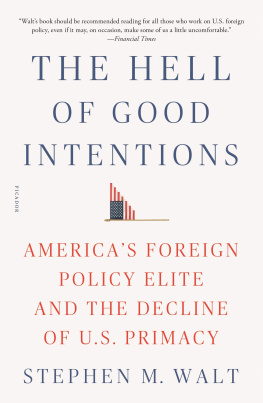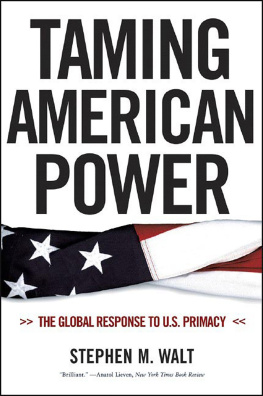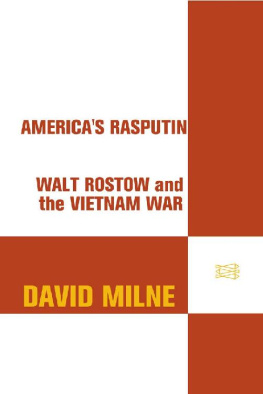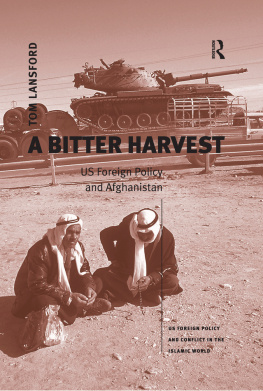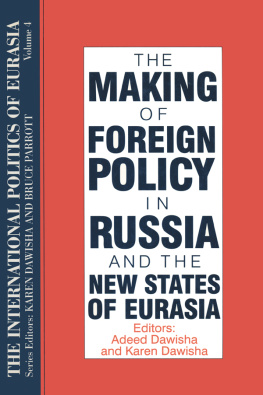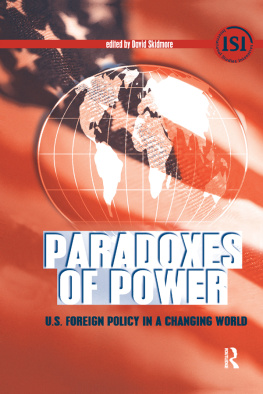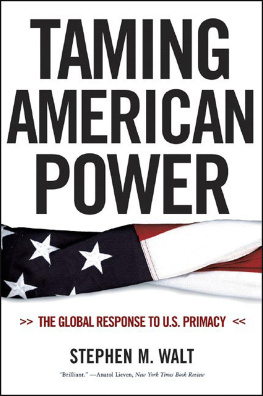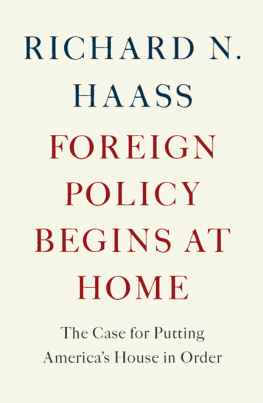Table of Contents
Landmarks
Pagebreaks of the print version

The author and publisher have provided this e-book to you for your personal use only. You may not make this e-book publicly available in any way. Copyright infringement is against the law. If you believe the copy of this e-book you are reading infringes on the authors copyright, please notify the publisher at: us.macmillanusa.com/piracy.
FOR MY FAMILY
I N MARCH 2013 , a member of the State Departments Policy Planning staff invited me to speak at the department and requested that I be provocative. Happy to comply, I titled my talk Why U.S. Foreign Policy Keeps Failing. A lively but friendly discussion followed, and it occurred to me afterward that my remarks might form the basis for a short book. I estimated it would take about a year to write.
Like the men and women responsible for U.S. foreign policy in recent years, I badly misjudged the difficulty of the task I had undertaken. Nonetheless, a full draft of the manuscript was complete in October 2016 and I anticipated the book would appear near the end of Hillary Clintons first year as president. The timing would be ideal, I thought, as I expected Clinton to repeat many of her predecessors mistakes, making a hard-hitting critique of U.S. grand strategy both timely and valuable.
Donald Trumps unexpected victory in November 2016 was an awkward surprise in more ways than one, but it was also an ideal opportunity to test my core argument about Americas foreign policy elite. Candidate Trump had challenged many enduring orthodoxies about U.S. foreign policy, and he was openly dismissive of (and dismissed by) Democratic and Republican foreign policy experts alike. Once in power, however, Trump discovered that overcoming the foreign policy establishment was much harder than he had expected. Trumps presidential style is obviously different from his predecessors and he has altered U.S. policy in some significant ways, but the foreign policy revolution that he promised back in 2016 remains unrealized. This book will help you understand why.
In some ways, this work is the logical continuation of a research program I began pursuing in graduate school. In The Origins of Alliances (1987), I argue that a proper understanding of the causes of international alliances could explain why the United States and its main allies were significantly stronger than the Soviet bloc, and could reduce concerns that key allies would realign with the Soviet Union if the United States did not constantly reassure them. Revolution and War (1996) explores the international effects of domestic revolutions and argues that efforts to overthrow revolutionary powers often contribute to spirals of hostility and thus make war with them more likely. Taming American Power (2005) explains why both friends and foes were concerned about Americas dominant position after the Cold War, shows how other states were trying to counter U.S. power or exploit it for their own ends, and argues that the United States could have defused such efforts by adopting a more restrained foreign policy. And in The Israel Lobby and U.S. Foreign Policy (2007), John Mearsheimer and I show how a powerful domestic interest group can influence U.S. foreign policy in significant ways, to the detriment of broader U.S. national interests.
Each of these works cast a skeptical eye at important elements of U.S. foreign policy and tried to show how it could be improved. The present book develops that theme in detail, focusing on the enduring role that elite foreign policy institutions play in shaping U.S. strategy and managing Americas relations with the wider world.
In particular, this book seeks to explain why the United States spent the past quarter century pursuing an ambitious, unrealistic, and mostly unsuccessful foreign policy. Having won the Cold War and achieved a position of primacy unseen since the Roman Empire, why did U.S. leaders decide to maintain a military establishment that dwarfed all others and expand an already far-flung network of allies, client states, military bases, and security commitments? Instead of greeting the defeat of its principal rival as an opportunity to reduce Americas global burdens, why did both Democrats and Republicans embark on an ill-considered campaign to spread democracy, markets, and other liberal values around the world?
This strategysometimes termed liberal hegemonyhas been a costly failure. Yet three successive administrationsunder Clinton, Bush, and Obamaclung to it, even as the costs mounted and the quagmires multiplied. Why did Washington persist in the face of repeated setbacks, and how did the foreign policy establishment convince the American people to support policies that were neither necessary nor successful?
Part of the explanation is Americas remarkable combination of wealth, power, and favorable geography. Because the United States is the worlds most powerful nation, faces no threats in the Western Hemisphere, and is protected from the rest of the world by two enormous oceans, it can intervene in distant lands without placing its immediate survival in jeopardy. Yet this explanation is not the whole story, because those same favorable circumstances would also permit the United States to reduce many of its overseas commitments and focus more attention on problems at home.
Instead of pursuing a more restrained grand strategy, U.S. leaders opted for liberal hegemony because the foreign policy community believes spreading liberal values is both essential for U.S. security and easy to do. They convinced ordinary citizens to support this ambitious agenda by exaggerating international dangers, overstating the benefits that liberal hegemony would produce, and concealing the true costs. And because members of the foreign policy elite are rarely held to account, they were able to make the same mistakes again and again.
This book is highly critical of the foreign policy establishment, but the nature of my critique needs to be properly understood. Americas foreign policy elite is not a conspiracy of privileged insiders who are consciously seeking to advance their own fortunes at the nations expense. On the contrary, the institutions examined in this book are filled with dedicated public servants who genuinely believe that U.S. dominance is good for the United States and for the rest of the world. At the same time, however, the pursuit of liberal hegemony appeals to this elites sense of self-worth, enhances their power and status, and gives them plenty to do. These individuals also operate in a system that rewards conformity, penalizes dissent, and encourages its members to remain within the prevailing consensus.
In short, most of the men and women examined in this book tried to advance the national interest as they saw it. Unfortunately, the strategy they pursued with such energy and dedication was fundamentally flawed, and their mistakes were sometimes egregious. With the best of intentions, Americas foreign policy elite did great harm to others and considerable damage to the United States itself. And unless and until a new elite emerges with a different view of Americas role and a greater willingness to pursue a strategy of restraint, the errors of the past twenty-five years are likely to be repeated.
A single book cannot produce a revolution in U.S. foreign policy. But it is my hope that this book will help hasten the day when the United States adopts a foreign policy that actually enhances its security and prosperity and makes Americas core values more attractive to others. A foreign policy with those qualities would be closer to what the American people actually want, and easier to defend at home and abroad.

